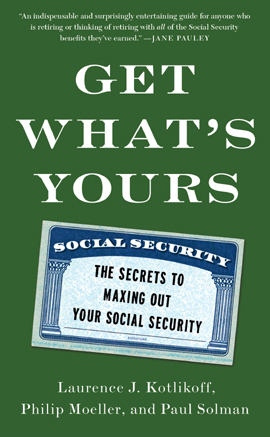This Social Security guide is a ... best seller
Social Security was designed to alleviate the stress and hardship of old age. But as an unlikely new best seller is demonstrating, the program itself has added to the stress and befuddlement of many Americans.
The book, called "Get What's Yours," is a guide to managing the complexities of Social Security, written by Boston University economist Laurence J. Kotlikoff, journalist Phil Moeller and "PBS NewsHour" economics correspondent Paul Solman. In the month since it's been published, the book has climbed the best-seller lists, is now Amazon's leading seller and is ranked No. 10 on The New York Times' advice list.
The book is getting a lift from a confluence of American demographic trends. It hit the bookstores just as the baby boom generation is starting to retire, which means many of the country's 75 million boomers are just now encountering the complexities of the Social Security system. Navigating that labyrinth is no mean feat: The program's overview handbook alone has more than 2,700 entries on topics ranging from black lung benefits to remarriage.
While the system has become more complex, the book notes, the agency itself is working with less.
"Social Security services more Americans than any other agency of government, including the Internal Revenue Service," the authors noted. "And yet it does so with shrinking staff and resources."
Despite increasing numbers of boomers filing for Social Security benefits, the agency has cut its employment by 11,000 positions, leaving it with about 75,000 workers, according to "Get What's Yours." That staff handles benefits for about 56 million Americans.
That's one reason why the book advises Americans thinking about retiring to be wary of taking advice from Social Security employees, noting that they are "overwhelmed with requests for advice, benefits calculations, and requests."
Americans have a lot at stake: Almost two-thirds of retirees rely on Social Security for the majority of their cash income, according to the progressive think tank Center on Budget and Policy Priorities. Even though the average monthly benefit is a modest $1,217, that's keeping about 14 million older Americans out of poverty, the think tank noted.
The book was written in the spirit of helping to level the playing field, with the authors noting, "It's not fair that some beneficiaries get more than others simply because they know they system's rules."
Some of the advice treads the familiar (if workers aren't waiting to take the benefit at 66 or 70, they're either "impudent" or "nuts"), but it also offers some arcane bits of knowledge that could save workers from making financial missteps. Among its tips are considering suspending your benefits, if you are already taking them, until you turn 70, at which point Social Security will add its Delayed Retirement Credit, or 8 percent a year, to the existing benefit.
Editor's note: The book is published by Simon & Schuster, a unit of CBS Corp., the parent company of CBSNews.com.
